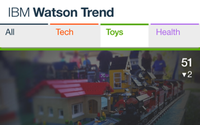Commentary
IBM Watson Tracks Holiday Shopping Buzz, IDs Hot Gifts, Predicts Sellouts
- by Chuck Martin , Staff Writer, November 18, 2015
 Amid numerous forecasts around the impact of mobile on holiday
shopping comes a new way to use mobile phones to see what people are likely to buy, courtesy of cognitive computing.
Amid numerous forecasts around the impact of mobile on holiday
shopping comes a new way to use mobile phones to see what people are likely to buy, courtesy of cognitive computing.
An added twist is that the technology also predicts which hot toys or other items are likely to sell out and by when and if a particular trend in what’s hot will stay that way.
The new app is IBM Watson Trend, from the computer system that made headlines by winning big at Jeopardy a while back. The computer is being tapped to provide real-time knowledge about what holiday gifts people are talking about now.
Watson monitors conversations from 10,000 Internet sources, blogs, social media sites, comments, ratings and product reviews to determine the sentiment of tens of millions of consumers. It then ranks the top trending products by three categories: consumer electronics, toys and health and fitness.
The app, which went live last night, is only available for iPhones, so Android owners will have to use the Watson Trend mobile website if they want to peek at trends.
This is yet another way mobile gets more involved in the shopping process.
We know from countless studies that most shoppers make their final purchase in a physical store, but it doesn’t mean mobile isn’t involved in major ways.
For example, the majority (66%) of consumers show a clear preference for using mobile devices while shopping, according to a new study.
The top influencers of in-store shoppers are store circular advertisements and email ads and coupons, according to the holiday shopping study by KSM and ORC International. The study comprised a survey of 1,000 U.S. consumers about their holiday shopping habits and general sentiments toward the coming season.
This means retailers have some influence, based on what they feature in their ads and emails. But when consumers take out their phones in stores, many become disconnected from the shopping process.
And adding Watson Trend to the mix can make it even more complex.
On the other hand, if retailers also keep an eye on trends via Watson, they may get some advance warning about which products will be in demand and which will be in short supply.
The idea of using heavy-duty processing, like from Watson, for new areas is not new.
At the recent IBM Insight conference in Las Vegas, the tech giant displayed how Watson was aiding the Weather Company in using data analytics around weather forecasting. The following day at that event, IBM announced that it was acquiring the Weather Company’s digital platform, linked into Watson, as I wrote about at the time (IBM Buys into Weather; Watson Gets a Boost).
As of today, the top trending items by category are:
- Consumer electronics – Apple Watch, Samsung TVs, Sony TVs, Canon cameras
- Toys – Lego City, Stars Wars Legos, Lego Friends, Minecraft Legos
- Health & Fitness – Nike running shoes, Vilano bikes, Trek road bikes
Rather than monitoring actual sales, Watson Trend really tracks buzz, or what people are talking about and then extrapolates insights from the buzz.
What strikes me as the most interesting aspect of this will be the final result.
Post holidays, we should be able to compare what people talked to what they bought.
Or maybe Watson can do that.




IBM is making a big push for its "predictive analytics" application suite, including, beyond the Watson supercomputer, SPSS, which they acquired a few years ago, and other software. Let's see how accurate the IBM predictions turn out to be. Will someone keep track, and make sure we can separate hype from statistics and data?
Yes, Henry, I'll be keeping track...IBM is as well, as you might imagine.